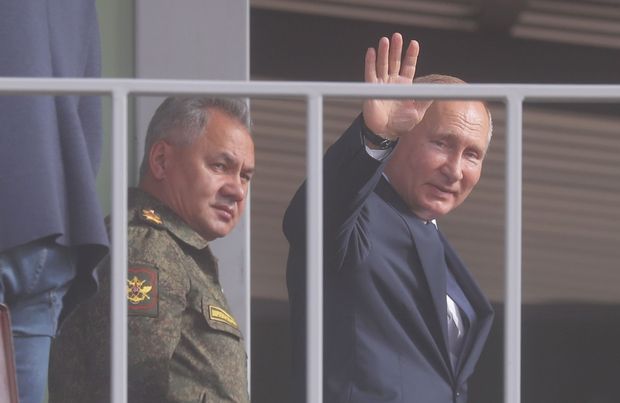
President Vladimir Putin, pictured Friday in Russia’s Astrakhan region, warned of ‘the risk of a large-scale confrontation in the digital sphere.’
Photo: maxim shipenkov/Shutterstock
American officials have been saying for months that Russia is meddling in the U.S. elections. On Friday, Russian President Vladimir Putin called for a truce, proposing the two countries conclude a pact that would guarantee neither nation interferes in the other’s elections.
The Russian president’s proposal comes just weeks before the Nov. 3 U.S. presidential election and amid U.S. intelligence and cyber experts’ findings that Moscow has already been undertaking efforts to influence that process.
In a statement published Friday by the Kremlin, Mr. Putin underscored that “one of the main strategic challenges of our time is the risk of a large-scale confrontation in the digital sphere” and called for measures “to reboot our relations” in the field of information and communication security.
This would include exchanging guarantees of nonintervention into the other’s internal affairs, the Russian president said.
Evidence from the U.S. intelligence community and cybersecurity specialists indicate that Moscow is already involved in foul play when it comes to the 2020 presidential vote.
In August, the U.S. intelligence community concluded that Russia has undertaken a broad effort to damage the Democratic nominee Joe Biden’s bid for the presidency, through media disinformation and a push to leak potentially damaging information about Mr. Biden.
“We assess that Russia is using a range of measures to primarily denigrate former Vice President Biden and what it sees as an anti-Russia ’establishment’” in Washington, William Evanina, director of the National Counterintelligence and Security Center, said in an Aug. 7 statement on election threats.
“Some Kremlin-linked actors are also seeking to boost President Trump’s candidacy on social media and Russian television,” Mr. Evanina said.

Voters in Arlington, Va., cast their ballots last week for the 2020 election at an early, in-person voting center.
Photo: andrew caballero-reynolds/Agence France-Presse/Getty Images
Earlier this month, Microsoft Corp’s threat intelligence team reported that Russian government hackers have targeted at least 200 organizations tied to the 2020 U.S. election, including national and state political parties and political consultants working for both Republicans and Democrats.
U.S. intelligence officials have said publicly that Russia is actively interfering in the 2020 presidential election, and that Kremlin-linked individuals are boosting Mr. Trump’s candidacy.
The Office of the Director of National Intelligence, which coordinates all 17 U.S. spy units, said on Thursday it had briefed U.S. lawmakers this week on election threats from Russia, China and Iran. The Senate Intelligence Committee was briefed on Wednesday, a Senate aide said.
Congressional investigations and a probe overseen by Special Counsel Robert Mueller also have confirmed U.S. intelligence findings that Russia engaged in a broadbased effort to interfere in the 2016 U.S. presidential election.
The Kremlin has denied allegations that it has meddled or is continuing to interfere in the U.S. election process and has accused U.S. lawmakers of “Russophobia,” or anti-Russian sentiments.
Mr. Putin in 2011 accused then-Secretary of State Hillary Clinton of fomenting opposition against him during widespread Russian protests in the wake of a disputed parliamentary election. Mrs. Clinton criticized the vote. Obama administration officials denied they were seeking to oust the Russian leader.
Mr. Putin suggested Friday that the measures he is proposing should lead to restoring regular full-scale bilateral interagency dialogue between U.S. and Russian agencies on key issues pertaining to international information security.
He also proposed that Moscow and Washington conclude a pact on preventing cyber incidents—similar to the U.S.-Soviet Incidents at Sea agreement in force since 1972 that seeks to reduce the chance of an incident at sea between the two countries and prevent any escalation if such an incident were to occur.
“We call on the U.S. to green light the Russian-American professional expert dialogue on [International Information Security] without making it a hostage to our political disagreements,” Mr. Putin said. “These measures are aimed at building up trust between our states, promoting security and prosperity of our peoples.”
Tensions over U.S. accusations of Russian election interference and Washington’s sanctions against Moscow have soured relations between the two powers.
The Treasury Department earlier this month sanctioned a Ukrainian lawmaker, Andriy Derkach, along with three Russians, saying they interfered in the 2020 U.S. election as Moscow’s agents.
Mr. Derkach has advanced theories about Mr. Biden’s involvement in his son Hunter’s entanglement with a Ukrainian gas company to undermine his candidacy, and has said that he has offered information to Republican lawmakers in Congress on the subject.
Republicans have denied receiving information from Mr. Derkach, who has denied similar allegations in the past. The Bidens have denied any wrongdoing.
Copyright ©2020 Dow Jones & Company, Inc. All Rights Reserved. 87990cbe856818d5eddac44c7b1cdeb8


